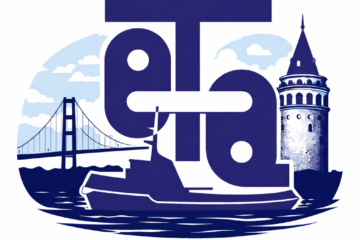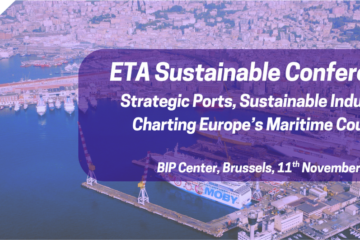Brussels, March 20th, 2025
A comprehensive Port Strategy that fosters European port services sustainability EMPA, ETA and EuDA organised a workshop on the pivotal role of human action as a key factor to decarbonise the port services sector. The speakers and panellists discussed the role of green and digital skills, the relevance of reskilling in an ageing personnel, labour conditions and the importance of offering attractive careers in the port services sector. The messages to take home from the workshop include:
The EU port services sector is of key importance to the EU’s economic growth and resilience. It plays an essential role enabling the seamless movement of goods, ensuring maritime safety and reinforcing port infrastructure climate resilience. Therefore, the upcoming European Port Strategy should be all-comprehensive, addressing a number of issues that affect the environmental and social sustainability of the European port services community.
The European Port Strategy should adopt a sustainable approach that balances environmental considerations and social aspects. Additionally, it should acknowledge the full complexity of the logistics ecosystem within ports. In this context, it is important to highlight that the main and most essential goal of port services is safety. This includes the safety of port workers and residents, navigation safety, protection of port assets, safety for the visiting vessels, as well as ensuring efficiency and environmental protection.
Moreover, ports are not only key enablers of trade and a strategic infrastructure that ensure Europe’s autonomy, but they should also be viewed as Innovation Hubs. In this regard, the three associations recommend a Strategy that treats ports with the same investment consideration as it does innovation centres. To support this, it is crucial that funding is directed toward ports and port services. Essential port services, such as towage, require this investment to fulfil their safety commitments and achieve climate goals. Thus, better targeted ETS funds for innovation could foster decarbonisation in ports and port services such as towage.
Ports can and should be recognised as Green Energy Hubs, as well. They are key in ensuring both Europe’s energy security and energy transition and they play an essential part in decarbonising the shipping sector in general and the port services industry in particular.
In addition to this, the port services community supports the Commission’s push for policy and legal simplification. In this context, regulations should be simplified and streamlined to ensure a level playing field among ports. We call for a Port Strategy that addresses this issue while also preventing the risks of gold plating and greenwashing.
When it comes to waterborne infrastructures, behavioural change must occur at multiple levels: first, with the infrastructure owner, focusing on sustainability to guide design, construction, and operations; second, with the contractor, which should adopt a multidisciplinary approach that incorporates Nature’s physical and biological forces into the design to harmonise the project with the natural environment; and third, with governance in awarding public procurement tenders in order to ensure that sustainability and innovation are prioritised.
In recent times, geopolitical tensions have intensified in Europe, where the weapon of choice is disruption. Incidents such as damaged subsea internet cables, GPS jamming and spoofing which navigational systems rely on and cyberattacks illustrate how vulnerable our interconnected systems can be. The port services community calls for the upcoming Port Strategy to consider the new geopolitical landscape, to address these risks and to prioritise security as a fundamental factor. Within this unpredictable context, highly trained professionals, such as maritime pilots, are essential as they can override autonomous systems and safely navigate and manoeuvre ships keeping supply chains open and the environment clean.
Finally, the European Port Strategy should have a human centred approach to make the maritime sector desirable to young people and strive towards a more inclusive workforce while supporting those already in the industry through the continued development of skills; both traditional and technological.
Moreover, ports are not only key enablers of trade and a strategic infrastructure that ensure Europe’s autonomy, but they should also be viewed as Innovation Hubs. In this regard, the three associations recommend a Strategy that treats ports with the same investment consideration as it does innovation centres. To support this, it is crucial that funding is directed toward ports and port services. Essential port services, such as towage, require this investment to fulfil their safety commitments and achieve climate goals. Thus, better targeted ETS funds for innovation could foster decarbonisation in ports and port services such as towage.
Ports can and should be recognised as Green Energy Hubs, as well. They are key in ensuring both Europe’s energy security and energy transition and they play an essential part in decarbonising the shipping sector in general and the port services industry in particular.
In addition to this, the port services community supports the Commission’s push for policy and legal simplification. In this context, regulations should be simplified and streamlined to ensure a level playing field among ports. We call for a Port Strategy that addresses this issue while also preventing the risks of gold plating and greenwashing.
When it comes to waterborne infrastructures, behavioural change must occur at multiple levels: first, with the infrastructure owner, focusing on sustainability to guide design, construction, and operations; second, with the contractor, which should adopt a multidisciplinary approach that incorporates Nature’s physical and biological forces into the design to harmonise the project with the natural environment; and third, with governance in awarding public procurement tenders in order to ensure that sustainability and innovation are prioritised.
In recent times, geopolitical tensions have intensified in Europe, where the weapon of choice is disruption. Incidents such as damaged subsea internet cables, GPS jamming and spoofing which navigational systems rely on and cyberattacks illustrate how vulnerable our interconnected systems can be. The port services community calls for the upcoming Port Strategy to consider the new geopolitical landscape, to address these risks and to prioritise security as a fundamental factor. Within this unpredictable context, highly trained professionals, such as maritime pilots, are essential as they can override autonomous systems and safely navigate and manoeuvre ships keeping supply chains open and the environment clean.
Finally, the European Port Strategy should have a human centred approach to make the maritime sector desirable to young people and strive towards a more inclusive workforce while supporting those already in the industry through the continued development of skills; both traditional and technological.


